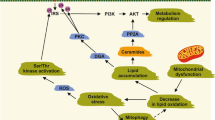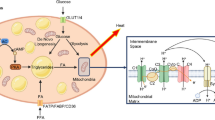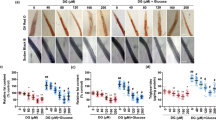Abstract
Abnormal fat accumulation, enhanced free fatty acids (FFA) release, and their metabolites cause insulin resistance (IR) in major glucose-lipid metabolic organs such as skeletal muscle and adipose tissue. However, excessive lipolysis and FFA release from adipose tissue elevate plasma FFA levels leading to oxidative stress and skeletal muscle IR. Indeed, in obese individuals, there is enhanced pro-inflammatory secretion from adipose tissue influencing insulin signaling in skeletal muscles. Here, we investigated the effect of PSTi8 on FFA-induced IR in both in vitro and in vivo models. Palmitate (Pal)-treated 3T3-L1 cells increased lipid accumulation as well as lipolysis, which reduced the insulin-stimulated glucose uptake. PSTi8 treatment significantly prevented Pal-induced lipid accumulation, and release and enhanced insulin-stimulated glucose uptake. It further reduced the release of pro-inflammatory cytokines from Pal-treated 3T3-L1 cells as well as from adipose tissue explants. In addition, PSTi8 treatment decreases M1 surface markers in Pal-treated bone marrow-derived monocytes (BMDM). PSTi8 treatment also significantly enhanced the Pal-mediated reduced skeletal muscle glucose disposal and reduced intracellular oxidative stress. In vitro effect of PSTi8 was consistent with in vivo HFD-fed mice IR model. PSTi8 treatment in HFD-fed mice significantly improved glucose metabolism and enhanced skeletal muscle insulin sensitivity with reduced adiposity and pro-inflammatory cytokines. Taken together, our results support that PSTi8 treatment can protect both adipose and skeletal muscles from FFA-induced IR.








Similar content being viewed by others
Data availability
Data set presented in the current study is available from the corresponding author at request.
References
Argilés JM et al (2005) Cross-talk between skeletal muscle and adipose tissue: a link with obesity? Med Res Rev 25(1):49–65. https://doi.org/10.1002/med.20010
Bandyopadhyay GK et al (2015) Pancreastatin-dependent inflammatory signaling mediates obesity-induced insulin resistance. Diabetes 64(1):104–116. https://doi.org/10.2337/db13-1747
China SP et al (2017) Globular adiponectin reverses osteo-sarcopenia and altered body composition in ovariectomized rats. Bone 105(75):86. https://doi.org/10.1016/j.bone.2017.08.005
Delarue J, Magnan C (2007) Free fatty acids and insulin resistance. Curr Opin Clin Nutr Metab Care 10(2):142–148. https://doi.org/10.1097/MCO.0b013e328042ba90
Ezzati M, Di Cesare M, Bentham J (2018) Determining the worldwide prevalence of obesity–authors’ reply. The Lancet 391(10132):1774. https://doi.org/10.1016/S0140-6736(18)30781-5
Fain JN et al (2004) Comparison of the release of adipokines by adipose tissue, adipose tissue matrix, and adipocytes from visceral and subcutaneous abdominal adipose tissues of obese humans. Endocrinology 145(5):2273–2282. https://doi.org/10.1210/en.2003-1336
Frayn KN (2005) Obesity and metabolic disease: is adipose tissue the culprit? Proc Nutr Soc 64(1):7–13. https://doi.org/10.1079/PNS2004403
Fridlyand LE, Philipson LH (2006) Reactive species and early manifestation of insulin resistance in type 2 diabetes. Diabetes, Obesity and Metab 8(2):136–145. https://doi.org/10.1111/j.1463-1326.2005.00496.x
Ghanemi A, Yoshioka M, St-Amand J (2021) Impact of adiposity and fat distribution, rather than obesity, on antibodies as an illustration of weight-loss-independent exercise benefits. Medicines 8(10):57. https://doi.org/10.3390/medicines8100057
Gupta S et al (2021) Coelogin ameliorates metabolic dyshomeostasis by regulating adipogenesis and enhancing energy expenditure in adipose tissue. Pharmacol Res 172:105776. https://doi.org/10.1016/j.phrs.2021.105776
Hegarty BD et al (2003) The role of intramuscular lipid in insulin resistance. Acta Physiol Scand 178(4):373–383. https://doi.org/10.1046/j.1365-201X.2003.01162.x
Henriksbo BD et al (2014) fluvastatin causes NLRP3 inflammasome-mediated adipose insulin resistance. Diabetes 63(11):3742–3747. https://doi.org/10.2337/db13-1398
Hernández EÁ et al (2017) Acute dietary fat intake initiates alterations in energy metabolism and insulin resistance. J Clin Investig 127(2):695–708. https://doi.org/10.1172/JCI89444
Huang S, Czech MP (2007) The GLUT4 glucose transporter. Cell Metab 5(4):237–252. https://doi.org/10.1016/j.cmet.2007.03.006
Jaiswal N et al (2015) Free fatty acid induced impairment of insulin signaling is prevented by the diastereomeric mixture of calophyllic acid and isocalophyllic acid in skeletal muscle cells. Eur J Pharmacol 746:70–77. https://doi.org/10.1016/j.ejphar.2014.10.049
Kahn BB, Flier JS (2000) Obesity and insulin resistance. J of Clin Investig 106(4):473–481. https://doi.org/10.1172/JCI10842
Krebs M, Roden M (2005) Molecular mechanisms of lipid-induced insulin resistance in muscle, liver and vasculature. Diabetes, Obesity and Metab 7(6):621–632. https://doi.org/10.1111/j.1463-1326.2004.00439.x
Lambertucci RH et al (2008) Palmitate increases superoxide production through mitochondrial electron transport chain and NADPH oxidase activity in skeletal muscle cells. J Cell Physiol 216(3):796–804. https://doi.org/10.1002/jcp.21463
Lass A et al (2011) Lipolysis—A highly regulated multi-enzyme complex mediates the catabolism of cellular fat stores. Progress Lipid Res 50(1):14–27. https://doi.org/10.1016/j.plipres.2010.10.004
Maurizi G et al (2018) Adipocytes properties and crosstalk with immune system in obesity-related inflammation. J Cell Physiol 233(1):88–97. https://doi.org/10.1002/jcp.25855
Nakamura S et al (2009) Palmitate induces insulin resistance in H4IIEC3 hepatocytes through reactive oxygen species produced by mitochondria. J Biol Chem 284(22):14809–14818. https://doi.org/10.1074/jbc.M901488200
Reza MI et al (2021) Pancreastatin induces hepatic steatosis in type 2 diabetes by impeding mitochondrial functioning. Life Sci 284:119905. https://doi.org/10.1016/j.lfs.2021.119905
Sakurai T et al (2017) Exercise training attenuates the dysregulated expression of adipokines and oxidative stress in white adipose tissue. Oxidative Med Cell Longev 2017:1–12. https://doi.org/10.1155/2017/9410954
Sharma A et al (1865) (2019) ‘Nod1-mediated lipolysis promotes diacylglycerol accumulation and successive inflammation via PKCδ-IRAK axis in adipocytes.’ Biochimica Et Biophysica Acta (BBA)–mol Basis Dis 1:136–146. https://doi.org/10.1016/j.bbadis.2018.10.036
Sharma A et al (2022) Insulin resistance corresponds with a progressive increase in NOD1 in high fat diet-fed mice. Endocrine 76(2):282–293. https://doi.org/10.1007/s12020-022-02995-z
Singh P et al (2020) Combination of pancreastatin inhibitor PSTi8 with metformin inhibits Fetuin-A in type 2 diabetic mice. Heliyon 6(10):e05133. https://doi.org/10.1016/j.heliyon.2020.e05133
Stannard SR, Johnson NA (2004) Insulin resistance and elevated triglyceride in muscle: more important for survival than “thrifty” genes? The J of Physiol 554(3):595–607. https://doi.org/10.1113/jphysiol.2003.053926
Tilg H, Moschen AR (2006) Adipocytokines: mediators linking adipose tissue, inflammation and immunity. Nature Rev Immunol 6(10):772–783. https://doi.org/10.1038/nri1937
Weisberg SP et al (2003) Obesity is associated with macrophage accumulation in adipose tissue. J Clin Investig 112(12):1796–1808. https://doi.org/10.1172/JCI19246
Acknowledgements
The authors gratefully acknowledge financial support from the Council of Scientific and Industrial Research (CSIR, Government of India). The authors would like to express their gratitude to the Director of CSIR-CDRI for his constant encouragement and support. CDRI communication number for the article is 10660.
Funding
J.R.G is grateful for research funding from the CSIR and the Department of Biotechnology, Government of India.
Author information
Authors and Affiliations
Contributions
The current research experiments were designed by RG and JRG. RG, AA, RK, UKG, NS, SY, SR, SV, DM, and SV did the experiments required and/or analyzed the data; RG and JRG compiled the data and prepared the manuscript.
Corresponding author
Ethics declarations
Conflict of interest
All the authors declare that there is no conflict of interest.
Additional information
Handling editor: E. Closs.
Publisher's Note
Springer Nature remains neutral with regard to jurisdictional claims in published maps and institutional affiliations.
Rights and permissions
Springer Nature or its licensor (e.g. a society or other partner) holds exclusive rights to this article under a publishing agreement with the author(s) or other rightsholder(s); author self-archiving of the accepted manuscript version of this article is solely governed by the terms of such publishing agreement and applicable law.
About this article
Cite this article
Garg, R., Agarwal, A., Katekar, R. et al. Pancreastatin inhibitor PSTi8 ameliorates insulin resistance by decreasing fat accumulation and oxidative stress in high-fat diet-fed mice. Amino Acids 55, 1587–1600 (2023). https://doi.org/10.1007/s00726-023-03332-y
Received:
Accepted:
Published:
Issue Date:
DOI: https://doi.org/10.1007/s00726-023-03332-y




